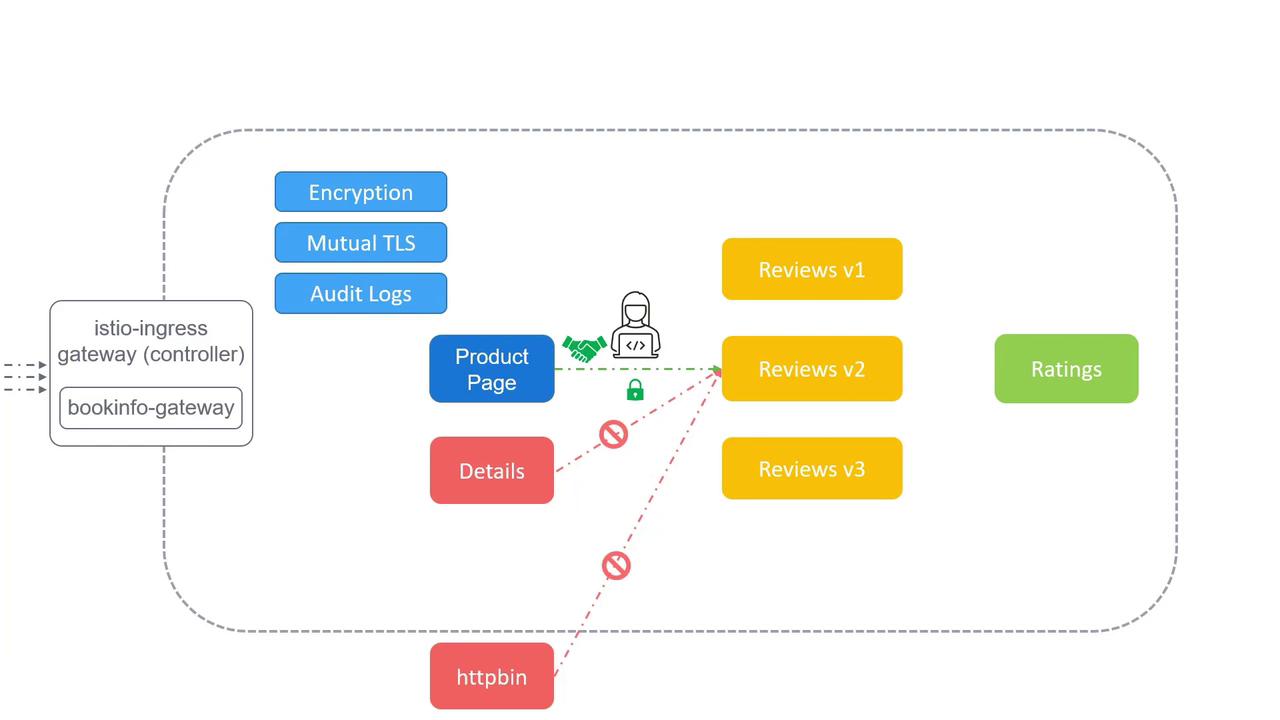Kubernetes and Cloud Native Security Associate (KCSA)
Platform Security
Service Mesh Security in Istio
Securing microservices involves three core requirements:
- Encryption of service-to-service traffic to prevent man-in-the-middle (MITM) attacks.
- Fine-grained access control to restrict which services can communicate.
- Audit logging to capture who accessed which service and when.
When one microservice calls another over the network, unencrypted traffic can be intercepted or modified. Istio’s service mesh tackles these challenges by providing mutual TLS (mTLS), policy-driven access control, and comprehensive telemetry for auditing.

In the sections below, we’ll explore:
- How to enable and configure mTLS in Istio
- Defining access control policies with
AuthorizationPolicy - Collecting and analyzing audit logs for compliance and forensics
1. Mutual TLS (mTLS)
Istio’s mTLS ensures that both client and server authenticate each other and encrypt all data in transit. This prevents eavesdropping and tampering by default.
Enabling mTLS
- Namespace-wide PeerAuthentication
apiVersion: security.istio.io/v1beta1 kind: PeerAuthentication metadata: name: default namespace: default spec: mtls: mode: STRICT - DestinationRule for TLS settings
apiVersion: networking.istio.io/v1beta1 kind: DestinationRule metadata: name: default namespace: default spec: host: "*.default.svc.cluster.local" trafficPolicy: tls: mode: ISTIO_MUTUAL
Note
Strict mTLS mode requires that all workloads have the Istio sidecar injected. Use kubectl label namespace default istio-injection=enabled if sidecars are missing.
2. Access Control Policies
Istio’s AuthorizationPolicy CRD lets you define which services can talk to each other. You can permit or deny traffic based on namespaces, principals, ports, and even request attributes.
Sample AuthorizationPolicy
apiVersion: security.istio.io/v1beta1
kind: AuthorizationPolicy
metadata:
name: reviews-access
namespace: default
spec:
selector:
matchLabels:
app: reviews
rules:
- from:
- source:
principals: ["cluster.local/ns/default/sa/productpage"]
This policy allows only the productpage service account to call reviews, blocking all other callers.
Common Policy Patterns
| Use Case | Resource | Key Field |
|---|---|---|
| Allow only one service as caller | AuthorizationPolicy | source.principals |
| Block traffic from unknown sources | AuthorizationPolicy | no from entry |
| Port-based access control | AuthorizationPolicy | to.ports |
Warning
Misconfigured policies can inadvertently block legitimate traffic. Always test changes in a staging environment before promoting to production.
3. Audit Logging
Istio captures detailed telemetry and access logs, which you can export to backends like Prometheus, Elasticsearch, or Stackdriver.
Enabling Access Logging
- MeshConfig with accessLogFile:
apiVersion: install.istio.io/v1alpha1 kind: IstioOperator spec: meshConfig: accessLogFile: /dev/stdout - EnvoyFilter for custom log format:
apiVersion: networking.istio.io/v1alpha3 kind: EnvoyFilter metadata: name: custom-log-format namespace: istio-system spec: configPatches: - applyTo: NETWORK_FILTER match: listener: filterChain: filter: name: "envoy.filters.network.http_connection_manager" patch: operation: MERGE value: typed_config: "@type": type.googleapis.com/envoy.extensions.filters.network.http_connection_manager.v3.HttpConnectionManager access_log: - name: "envoy.access_loggers.stdout" typed_config: "@type": type.googleapis.com/envoy.extensions.access_loggers.stream.v3.StdoutAccessLog log_format: text_format_source: inline_string: "[%START_TIME%] %REQ(:METHOD)% %REQ(X-ENVOY-ORIGINAL-PATH?:PATH)% -> %RESPONSE_CODE%\n"
With logs centralized, you gain visibility into who accessed which service and when—crucial for troubleshooting and compliance.
Links and References
- Istio Security Concepts
- Mutual TLS Migration
- Authorization Policy Reference
- Envoy Logging Configuration
- Kubernetes Documentation
Watch Video
Watch video content